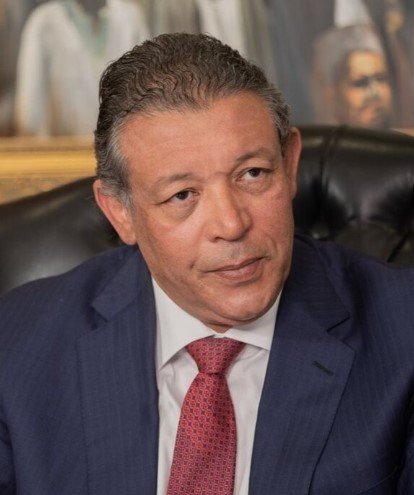A casual meal between diplomats in Cairo this week hinted at a deeper effort to reset ties and recalibrate their positions on Gaza and the broader Middle East. And it didn’t happen behind closed doors—but over lunch, right in public view.
The Turkish Ambassador to Egypt, Salih Mutlu Şen, and Egyptian Senator Hazem Omar, who chairs the Senate’s Foreign, Arab, and African Affairs Committee, met on Monday at Crimson Restaurant, a trendy Nile-side spot known more for its panoramic views than for political overtures. But this wasn’t just a social call.
Turkey’s Diplomatic Soft Touch
The optics of this encounter were telling. It wasn’t a formal summit or a heavily choreographed handshake. It was a relaxed setting, shared food, light conversation—and unmistakably, a serious subtext.
Şen, Ankara’s envoy to Cairo since normalization talks began heating up again in late 2022, has kept a lower profile in public since the recent Iran-Israel-Gaza escalations. But on Monday, he used X (formerly Twitter) to share a photo and a message that sounded almost casual—yet it wasn’t.
“We had a great chat about his recent trip to Ankara and his insights about regional developments including in Gaza,” Şen wrote.
That’s the line everyone’s parsing.
Hazem Omar’s Ankara Trip: What We Know (and Don’t)
The Egyptian senator’s visit to Ankara hasn’t been widely reported until now. There’s no official itinerary released by the Senate or Egypt’s Foreign Ministry.
But what we do know, according to sources in both Cairo and Istanbul familiar with the matter, is that Omar was part of an informal exploratory visit earlier this month. The goal, reportedly, was to open a backchannel on regional mediation efforts—especially around Gaza.

The trip came just days after Egypt intensified its push to maintain the Iran-Israel ceasefire and floated a revised 60-day Gaza truce plan, with Qatar and U.S. backing. Some Egyptian officials have quietly acknowledged that Turkey’s leverage over Hamas—and its backchannel with Tehran—makes it a critical player in any regional ceasefire blueprint.
One Egyptian diplomat put it plainly: “We can’t shape Gaza’s future without at least hearing from Ankara. That’s just the truth.”
Gaza, Quiet Talks, and the Ankara-Cairo Equation
Gaza was the obvious elephant at the table during the lunch in Cairo. But it wasn’t the only topic. Sources say the two also discussed Libya, Sudan, and the still-fragile Iran-Israel truce.
Still, Gaza dominated.
That’s not surprising, considering how both countries—while holding different allegiances—are under pressure to show they can stabilize the region.
Egypt, long the default broker between Hamas and Israel, has been facing public criticism for delays in aid deliveries and lack of tangible progress. Turkey, on the other hand, has openly condemned Israeli strikes while continuing to maintain trade relations with Tel Aviv.
-
Turkey’s position gives it leverage with both Hamas and Iran.
-
Egypt’s border with Gaza and history as a peace negotiator gives it ground-level access.
The challenge is obvious: both want to lead, but neither can act alone.
Table Talk: More Than Just Diplomacy Over Dessert
What was said at that lunch table may never be fully known. But the tone and timing tell part of the story.
This wasn’t some emergency war-room situation. No press conference followed. No long joint statement. Just two high-ranking officials chatting, reportedly about regional “insights.”
For longtime watchers of Egyptian-Turkish relations, that feels almost surreal. Just three years ago, Cairo and Ankara weren’t even speaking at ambassador level. Erdoğan had backed the Muslim Brotherhood in Egypt, fueling years of icy hostility with President Abdel Fattah El-Sisi’s government.
Now, there’s a different kind of language: mutual respect, informal engagement, and cautiously aligned interests.
There was even a touch of symbolism in the venue choice. Crimson is known locally for being chic but relaxed, diplomatic without being stiff. A place for private chats without full secrecy. In short: perfect for semi-public diplomacy.
A Low-Key Lunch That Could Shape Bigger Moves
Hazem Omar’s role in the Senate has been growing, and this lunch may mark a subtle elevation in his portfolio. While he doesn’t represent Egypt’s Foreign Ministry, his committee chairmanship puts him in regular contact with top diplomats and regional players.
In fact, based on recent conversations among staffers in the Egyptian Senate, there’s a quiet push to elevate “parliamentary diplomacy” as a parallel track. It’s soft, unofficial, and deniable—exactly what some regional issues may need right now.
One aide described Omar’s recent efforts as “bridge-building through personality.”
Still, Cairo hasn’t officially commented on the lunch. Nor has Ankara issued a formal readout. But insiders in both capitals say the momentum is quietly building. They say the Gaza file has become “too sensitive” to leave to just one player.
So Egypt and Turkey are talking—at the table, and likely behind the scenes too.
